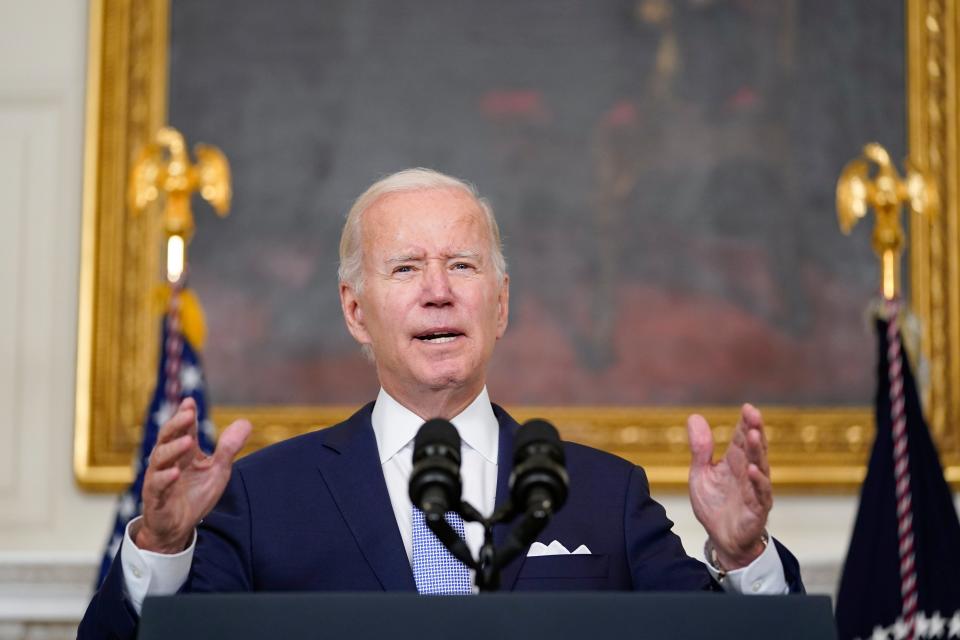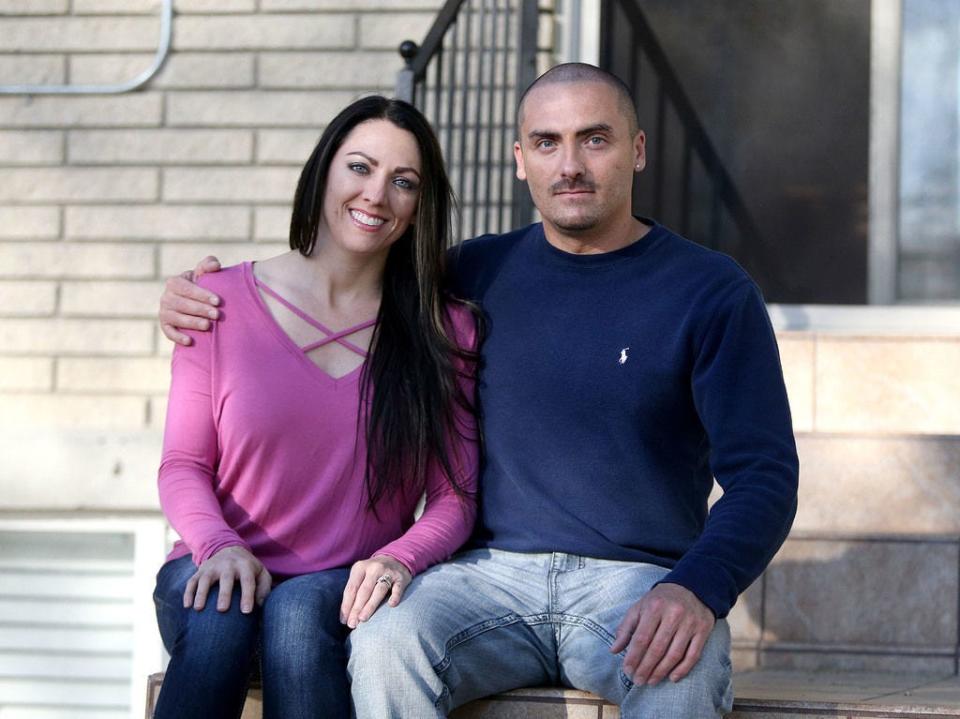Marijuana is being legalized in parts of US. That's not helping everyone with convictions.
- Oops!Something went wrong.Please try again later.
She applied for a job wearing an ankle monitor. She lost time with a loved one who was near death.
Those are a few of the many burdens of Stephanie Shepard, who was sentenced to 10 years in federal prison after being convicted of conspiracy to distribute more than 1,000 kilograms (about two tons) of marijuana.
Out of prison since 2019, Shepard, now 52, is confronting a changing marijuana landscape in which California, New York, New Jersey and other states have chosen to decriminalize the substance, birthing nascent legal marijuana markets.
But Shepard, who lives in Sacramento, California, wants to see the people with cannabis offenses on their criminal record and those who remain incarcerated get more consideration, particularly in the form of expungement or resentencing.

OPINION: The one unfortunate group that Brittney Griner belongs to now
TIME FOR CHANGE: Federal ban on marijuana use causes more harm than good
“I was found guilty, and I accept that. What I can’t accept today is people still being arrested and people still being held,” said Shepard, who works as a partnership manager and is on the board of directors at the Last Prisoner Project, a nonprofit dedicated to cannabis criminal justice reform. “Sixty-year sentences for the same plant that I can go within a mile of my house, if I were able to, and go purchase.”
The time might be ripe for at least some reform. In Congress, lawmakers are considering several pieces of legislation decriminalizing the substance on the federal level.
And while there is a lesser appetite for overarching legislation to address marijuana at the moment, smaller bills aimed at expungement and resentencing, as well as another aimed at marijuana banking, have a better chance of passage, several policy analysts told USA TODAY.
Morgan Fox, political director for the nonprofit National Organization for the Reform of Marijuana Laws, said Congress is still far from comprehensive reform but bipartisan momentum is moving in that direction.
“The conversation is clearly becoming not so much whether we should do this but exactly how we should do this outside of the few outliers,” he said.
Natalie Papillion, director of strategic initiatives at the Last Prisoner’s Project, said legalization must involve a pathway for incarcerated people.
“I think you can’t do that (legalization) without acknowledging that people have been arrested and incarcerated, for sometimes decades for no good reason, for sort of a policy that made no sense,” she said.
Brittney Griner case in Russia brings attention to marijuana incarceration
Emphasis on the bills comes as marijuana incarceration faces international scrutiny following the imprisonment of American basketball player Brittney Griner in Russia. The WNBA star and two-time Olympic champion has been in custody since February when law enforcement in Moscow said they found vape cartridges containing cannabis oil in her luggage.
In August, a judge sentenced her to nine years in a penal colony. President Joe Biden said at the time that Russia wrongfully detained Griner.
“It’s unacceptable, and I call on Russia to release her immediately so she can be with her wife, loved ones, friends, and teammates,” Biden said in a statement.

While campaigning ahead of the 2020 election, Biden said marijuana should be decriminalized and that people should have their records expunged. In April, Biden granted clemency to nine people with federal marijuana offenses — far fewer than advocates had expected.
White House press secretary Karine Jean-Pierre said in July that Biden “continues to evaluate further uses of clemency powers.”
In 2021, federal officials charged about 1,000 people with violating marijuana laws, according to a United States Sentencing Commission report cited by NORML. In 2012, federal officials charged nearly 7,000 people.
More than 540,000 people were arrested for marijuana-related offenses in 2019 —primarily for state offenses, according to the FBI.

And despite similar usage rates, African Americans remain more likely to be arrested for marijuana possession in every state — including states that have legalized recreational use, according to the American Civil Liberties Union.
Maritza Perez, director of the Drug Policy Alliance’s Office of Federal Affairs, said arrests follow people many times for the rest of their lives and impact their ability to find housing or feed their families.
The Drug Policy Alliance is a pro-legalization advocacy organization that seeks to promote alternatives to the war on drugs.
“It's really important that any marijuana bill de-schedules marijuana but also acknowledges the harms of endemic prohibition through resentencing and expungement so that people can build up their lives,” said Perez.
MORE Act, Hope Act, other legislation aims to expunge cannabis convictions
The Cannabis Administration and Opportunity and the Marijuana Opportunity, Reinvestment and Expungement (MORE) acts are both comprehensive pieces of legislation that establish a process to expunge convictions and review the sentences for some marijuana offenses while also decriminalizing the substance.
The MORE Act gives the federal government a year to review marijuana offenses and expunge certain cannabis offenses since 1971 — around the same time as the start of the country's war on drugs campaign.
The House passed the MORE Act earlier this year, but it's expected to falter in the Senate.
OUR VIEW: Time for change: Federal ban on marijuana use causes more harm than good
The Cannabis Administration and Opportunity Act, which was introduced by Democratic Sens. Cory Booker, Chuck Schumer and Ron Wyden last month, would initiate automatic expungement for certain non-violent cannabis offenses.
There are other pieces of legislation, too — including the Safe and Fair Enforcement (SAFE) Banking Act, which, if passed, would generally eliminate criminal prosecution for financial institutions that take money from the legal marijuana industry, opening the banking industry to people who operate businesses.
A report published by Ohio State University’s Drug Enforcement and Policy Center, however, said the legislation as written is “unlikely to result in equitable access to financial services.”
The report calls for federal banking regulators to identify best practices for racial parity in financial services and clarify that cannabis criminal records are not an automatic red flag.
"Moreover, the SAFE Banking Act neither acknowledges, nor takes any steps to address, existing and longstanding inequities that are prevalent throughout the financial services industry," according to the report called "Not a SAFE Bet: Equitable Access to Cannabis Banking. "These inequities are likely to persist and could worsen for cannabis businesses who experience compounded racial inequities in the cannabis industry.
Last month, bipartisan House legislators introduced the Marijuana Misdemeanor Expungement Act, which seeks to set up a process where low-level federal cannabis charges can be expunged.
Another piece of legislation, the Harnessing Opportunities by Pursuing Expungement (HOPE) Act, aims to help states with expunging cannabis offenses by reducing the financial and administrative burden of such efforts with $20 million in grants.
Smart Approaches to Marijuana — an organization that has stood against several legalization efforts – has argued at full legalization would boost profits for Big Tobacco and questioned whether legalization would indeed bring about social equity.
“Our main concern with legalization is the commercialization and normalization of a drug by an addiction-for-profit industry. This movement isn’t being led by hippies who want peace and love, it’s being led by mostly white men in corporate America who want to make money,” said Kevin Sabet, the organization's president and CEO.
One aspect that SAM does support: A method to get people out of jail or prison.
“We don't want to throw people in prison or give them criminal records or arrest records, and we do support expungement of low-level possession,” Sabet said.
'We can't move forward without remedying the past injustice'
In 2005, Shepard went to New York to pursue a career in real estate and became involved with a former boyfriend who was eventually convicted of marijuana offenses, court records show.
While trying to help him, Shepard herself became the focus of prosecutors and was convicted, she said.
"I could have been out with my background, making money, paying a fine, something that did not include ruining, essentially my life, at the time and my family's lives," she said.
And the loss of her nearly 98-year-old father while she was in prison stays with her.
“I never got that opportunity to sit down with him and explain to him what my involvement was … or how sorry I was,” she said.
Weldon Angelos is also living with the scars of a marijuana conviction.
Today, Angelos is a clemency advocate who works to support legislation to undo the harm of cannabis prohibition. His advocacy is a long place from where he was nearly two decades ago. In 2004, Angelos was sentenced to 55 years in federal prison for marijuana and other offenses committed.
His conviction ended a budding music-producing career that included working with the likes of Snoop Dogg. Instead, he spent more than 10 years of his mandatory sentence in a federal prison in Southern California after he was accused of having weapons during marijuana deals. At the time, he didn't have a criminal record.
Angelos said the conviction was destructive to him and his family.
"My two sons had to live on the system," he said. "It just completely wrecked my life."

His case led to widespread public outcry and he was later granted clemency after the judge in the case, Democratic Sen. Booker of New Jersey and others advocated for his release.
While his case has received widespread coverage, Angelos told USA TODAY he still suffers consequences for his record. His hopes of owning a marijuana dispensary, for example, have been stifled because of his conviction.
“We can't move forward without remedying the past injustice,” he said. “That would just compound the injustice of having people incarcerated while one segment of the population gets to profit from it.”
Tiffany Cusaac-Smith covers race and history for USA TODAY. Click here for her latest stories. Follow her on Twitter @T_Cusaac.
This article originally appeared on USA TODAY: Marijuana laws are changing. What about people with past convictions?

